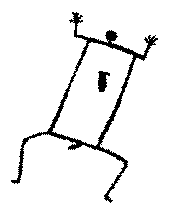| the Dao of Atheism : |  |
: the Shaman Atheist 2/81 |
2
|
Everyone knows what god is -- that is how we know what is not god. Everyone knows what good is -- that is how we know what is not good. This is how being and not-being, experience and non-experience, theism and atheism create each other and are mutually dependent. Light and dark complement each other, long and short form one another, low and high are relative, sound and tone are harmonies. Wise persons do not judge good or bad do not take action for or against do not disown judgment or action but practice a silent teaching. Only together do opposites make a whole. The world is acted upon by even the passive observer, still nothing is taken and nothing is destroyed. Things are created, actions taken, but no claim is made upon them. Things are controlled but not manipulated for personal gain. Compensation -- verbal or material -- is never the desired goal. |
What we like to think of as theological opposites are actually twins to each other, co-dependent upon each other for their mutual definition. The definition of god changes with every age. No definition will suit every one. Yet every person that experiences god can speak of that experience. Likewise every person without the experience of god can speak of that non-experience. It is like two people: one who can see light and one who cannot. Neither is inherently better for the experience of light or not. Both can describe their life to each other according to mutual experiences, but it stops at the point of distinguishing light from dark, sunny from cloudy, blue from orange. The seeing person might say that blindness is a disability, yet sight is an impossible experience to the blind person, and no-sight is their natural state of being. Which is better? In making the distinctions, we dissolve the bond between both sides of the issue and force them farther apart. Theism and atheism are inextricably united to each other -- one cannot live without the other. Buddhism as an atheism has survived without a theism to complement it, yet types of Buddhism have incorporated theistic elements within it, as have certain branches of Christianity adapted to elements of atheism. Experience, whether theistic or atheistic, cannot be forced. Both sides promote beliefs which they hope will lead to a calculated religious experience, yet neither side claims victory: there is none to gain. |
middle :: last
cover :: endnotes
©1992 tpkunesh@atheisms.info